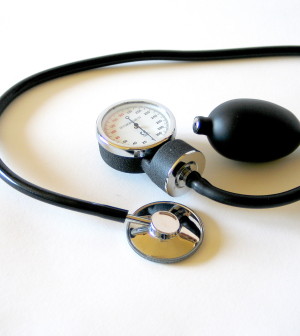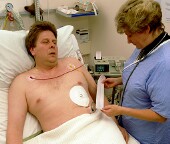- Could Your Grocery Store Meat Be Causing Recurring UTIs?
- Are You Making This Expensive Thermostat Error This Winter?
- Recognizing the Signs of Hypothyroidism
- 10 Strategies to Overcome Insomnia
- Could Artificial Sweeteners Be Aging the Brain Faster?
- Techniques for Soothing Your Nervous System
- Does the Water in Your House Smell Funny? Here’s Why
- Can a Daily Dose of Apple Cider Vinegar Actually Aid Weight Loss?
- 6 Health Beverages That Can Actually Spike Your Blood Sugar
- Treatment Options for Social Anxiety Disorder
Heart Attack Patients Treated at Night, Weekends May Have Worse Outcomes


The time at which heart attack patients arrive at the hospital may affect their chances for survival, new research suggests.
Showing up at the emergency room at night, on weekends or during holidays is associated with a 13 percent higher risk for death than arriving during regular business hours, researchers report.
Every year, more than 250,000 people suffer a ST-elevation myocardial infarction — the most severe type of heart attack, which is caused by a complete blockage of blood flow to the heart. Restoring blood flow as quickly as possible by giving clot-busting medication or performing an angioplasty to open the blocked vessel is critical for survival, according to the American Heart Association (AHA).
In conducting the study, the researchers analyzed the treatment and survival of more than 27,000 patients who experienced this type of severe heart attack and arrived at the hospital after regular business hours. These patients were compared to almost 16,000 patients who went to the hospital during business hours. These heart attacks occurred between January 2007 and September 2010, and the patients were treated at one of 447 hospitals across the United States.
Although the time of day did not affect when heart attack patients were given aspirin, underwent imaging tests or received clot-busting medication, those who went to the hospital during the day received an angioplasty, on average, 16 minutes sooner than those who arrived at night, the study found. The findings were reported July 29 in the journal Circulation: Cardiovascular Quality and Outcomes.
During angioplasty, a catheter or tube with a deflated balloon at the tip is threaded into the heart. The balloon is then inflated in the blocked artery to restore blood flow. A mesh tube, called a stent, may also be implanted to help keep the artery open.
Patients who arrived at the emergency room on a weekday during regular business hours had an average wait for angioplasty of 56 minutes. In contrast, those who arrived at night, on the weekend or during a holiday waited an average of 72 minutes.
The AHA recommends patients who have a ST-elevation myocardial infarction undergo an angioplasty within 90 minutes.
“Slower door-to-balloon times for people who arrived at the hospital during off hours is likely due to staffing. In the middle of the night, the hospital catheterization lab, where angioplasty and other artery-opening procedures are performed, is closed,” study author Dr. Jorge Saucedo, chief of cardiology and co-director of the Cardiovascular Institute at NorthShore University Health System in Evanston, Ill., explained in an AHA news release. “When a heart attack patient comes to the emergency department at 1 a.m., the emergency staff activate the pagers. Doctors need to drive to the hospital, get things set up in the cath lab, and it takes time.”
More information
The U.S. National Heart, Lung, and Blood Institute provides more information on treatment for heart attack.
Source: HealthDay
Copyright © 2026 HealthDay. All rights reserved.










